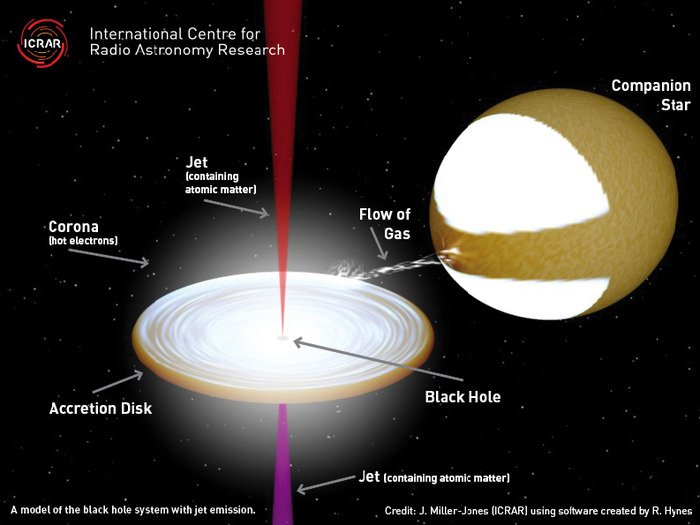This is a model of the black hole system with the jets that have been found to contain atomic matter. Credit: J. Miller-Jones (ICRAR) using software created by R. Hynes.
PERTH, Australia, Nov. 13 (UPI) -- Astronomers may have answered a longstanding question about enigmatic jets of matter emitted by black holes, a British scientific journal reports.
An international team's research on the narrow beams of matter ejected at high speeds from the vicinity of black holes at the center of many galaxies has been published in the journal Nature.
"Although they have been observed for decades, we're still not sure what they are made of, or what powers them," lead study author Maria Diaz Trigo of the European Southern Observatory said.
The team studied the radio waves and X-rays emitted by a small black hole a few times the mass of the Sun, detecting lines appearing in the X-ray spectrum, the telltale signature of ordinary atoms.
"Intriguingly, we found the lines were not where they should be, but rather were shifted significantly," said James Miller Jones, who led the radio observations at the International Center for Radio Astronomy Research in Perth, Australia.
"We've known for a long time that jets contain electrons, but haven't got an overall negative charge, so there must be something positively charged in them too," he said.
"Until now it wasn't clear whether the positive charge came from positrons, the antimatter 'opposite' of electrons, or positively charged atoms. Since our results found nickel and iron in these jets, we now know ordinary matter must be providing the positive charge."
Positively charged atoms are much heavier than the positrons astronomers had thought might make up the jets, proving the jets can carry away far more energy from the black hole than previously confirmed, the researchers said.















